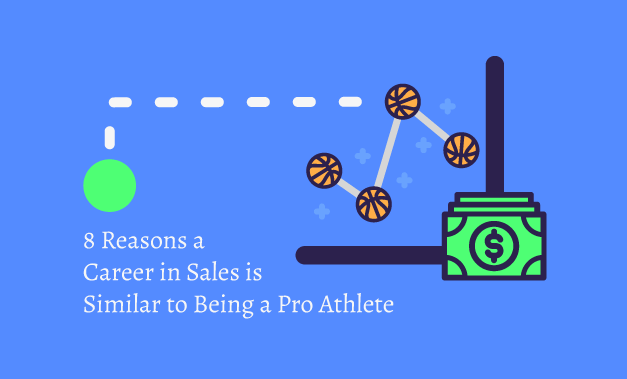Like many that have a career involved in sales, I wanted to be a professional athlete when I was a kid.
For 99 percent of people, the dream of going pro is dashed when your physical ability no longer matches your competitive spirit. Personally, I hit this ceiling at about the eighth grade/junior varsity level, so my dream of being a professional athlete was dead by the time I turned thirteen. I hope that most of you readers got closer to the dream than I did!
Fortunately, I got to live the nonathletic version of that dream through my sales career. The same things that attracted me to sports were prevalent in sales: the competitiveness, the scorekeeping, the risk, the high swings, and the ups and downs of victory and defeat.
I believe, for better and for worse, a quota-carrying role at a tech start-up is the closest you can get to being a professional athlete. This article explains why!
The Upsides to Why a Sales Career is Like Being a Pro Athlete
Competition
Just like pro athletes, salespeople are always competing. This may also be true for other professions. However, when it comes to sales, the judgment is numerical and (generally) free of politics. There are clear winners, losers, and rankings, and they’re often posted publicly for the whole company to see. (Only a sales guy like me would put this in the “upsides” category!)
The Spotlight
There’s an entire company of people working to make your offering great and your company succeed. However, none of it matters unless the sales team can deliver revenue based on that work. This is especially true at a startup where everyone’s waiting to see if their work can indeed translate into the massive amounts of revenue the VCs expect.
Team Environment
Just like on a good sports team, good sales teams rally around each other and form bonds.
Work Ethic and Control
You don’t have to rely on others to put the work in. You can work as hard as you like, and you get the benefits of that work.
Control Over Compensation
Top sales reps often earn more than the CEO. In most cases, we aren’t talking Michael Jordan money, but the sales department at any good company is weighing on the heavy end of a company average.
…and the Downsides
The Endless Pressure
Similar to professional athletes, those with sales careers need to prove themselves to be valuable each year. The more previous success you’ve had, the more leeway you get. However, even LeBron James will be benched or forced to retire when he’s no longer as effective as his future replacement. The same dynamic applies in sales.
Unsustainability
Many good startup sales reps ultimately opt for management, other careers, or lower-risk sales jobs, even if those positions pay less. The pressure of hitting numbers year after year is very difficult, and for most people, it won’t be sustainable in the long term. Anticipating slumps will ease worry when they inevitably happen.
Varying Compensation
Young sales reps can earn a lot of money early in their sales career, but it’s important to understand the context of these earnings.
A young sales rep that earns $200K a year at a startup is doing great and likely has an exciting and lucrative career ahead. But just like an athlete that has gone pro, making $200K this year is not the same as earning $200K in a traditional career.
If a doctor earns $200K, it’s safe for her to assume she can and will continue earning that much, if not more, every year for decades. The doctor can reasonably base her lifestyle around that assumption.
New sales reps, on the other hand, need to take a different view. They need to know that they could become unable to earn that much, or that doing so may not be a good lifestyle choice for the long term.
Conclusion
I believe startup sales positions are a great option for those looking for the same thrills of a pro-athlete career. If you’ve got the right skills and personality, get in the game! But if you choose to remain on the court long term, make sure you understand the situation clearly.




























































